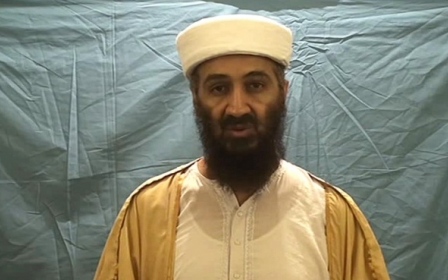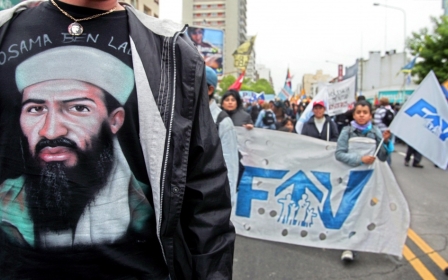Bin Laden left millions to 'jihad' in handwritten will

The handwritten will of Osama bin Laden, the founder of the al-Qaeda militant group, reveals his wish that most of the millions of dollars he had stashed in Sudan were to be donated to fund "jihad".
The document was among a tranche of newly declassified files that had been seized by Navy SEALs on 2 May 2011 when they descended on bin Laden's hideout in the Pakistani garrison town of Abbottabad and killed him.
The first materials from the raid were released in May 2015. Among that trove was a list of what was on bin Laden's bookshelf when Navy SEALS raided his compound, in addition to an al-Qaeda job application.
The Office of the Director of National Intelligence (ODNI) released dozens of documents, including one they said was bin Laden's will that deals with monies in Sudan.
Written in Arabic on a single piece of lined paper, the signed will states bin Laden had about $29 million in Sudan, and that much of it had come from his brother.
"I received twelve million dollars from my brother Abu Bakir Muhammad bin (Laden) on behalf of Bin Laden Company for Investment in Sudan," he wrote, according to the ODNI's translation of the document.
"I hope, for my brothers, sisters, and maternal aunts, to obey my will and to spend all the money that I have left in Sudan on jihad, for the sake of Allah."
Bin Laden sheltered in the Sudanese capital Khartoum for five years in the early 1990s. The ODNI did not immediately return a call seeking information on what happened to the purported hoard.
The documents also show a growing schism between bin Laden's lieutenants and al-Qaeda in Iraq, and said bin Laden was planning a worldwide media campaign for the 10th anniversary of the 11 September 2001 attacks.
In a letter to his father dated 8 August 2008, bin Laden wrote that he was worried about being assassinated.
"If I am to be killed, pray for me a lot and give continuous charities in my name, as I will be in great need for support to reach the permanent home," bin Laden wrote.
He also asks his dad for absolution, without saying what he might be regretting.
"I would like you to forgive me, if I have done what you did not like," he wrote.
He was also concerned about secret monitoring devices, and using different pennames, urging his fellow members to remain vigilant.
After his wife visited a dentist in Iran, bin Laden was worried that a tracking chip may have been implanted in his her dental filling.
"The size of the chip is about the length of a grain of wheat and the width of a fine piece of vermicelli," Bin Laden wrote.
A first tranche of documents released last May showed bin Laden was worried about drone strikes, and laid out plans to groom a new cadre of leaders.
Bin Laden also warned that conflict with governments in the Middle East would distract militants from hitting hard at what as far as he was concerned is the real enemy, which was the United States.
There are plans to release further documents recovered from Bin Laden's compound later this year.
"The document review process can be time consuming because, once a document is declassified, it cannot be reclassified," the ODNI said on its website.
"The Intelligence Community needs to ensure no declassified document will directly injure efforts to keep the nation secure."
New MEE newsletter: Jerusalem Dispatch
Sign up to get the latest insights and analysis on Israel-Palestine, alongside Turkey Unpacked and other MEE newsletters
Middle East Eye delivers independent and unrivalled coverage and analysis of the Middle East, North Africa and beyond. To learn more about republishing this content and the associated fees, please fill out this form. More about MEE can be found here.




